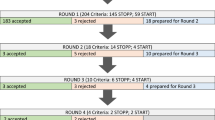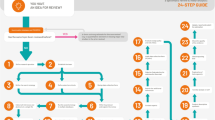Abstract
There is a general consensus about the underlying theoretical ethical principles that ground the practice of pediatric clinical trials: scientific necessity, good risk/benefit ratio, minimized burden, and parental consent/child assent. However, these principles are so broadly construed that it is not always clear how they should be applied in clinical practice. We conducted a qualitative study at Ghent University Hospital and the hospital of the Dutch-speaking university of Brussels on how researchers weigh ethical principles, assess the risk/benefit balance, estimate patient experience, and experience informed consent procedures in pediatric drug studies. Based on our assessment of the burden and risk versus benefit ratio in 62 pediatric drug research protocols, we selected 21 studies for further study to maximize diversity. Twenty-seven researchers (17 physicians, 10 study nurses) completed a qualitative survey about their study. We compared their responses to our assessments. The risk benefit assessment of our participants about their own research projects resembled our assessment almost perfectly. Assessing burden appeared to be more subjective. The researchers were confident in their ability to obtain valid consent. However, we question whether this confidence is warranted.
Conclusion: We argue for constant ethical reflexivity in pediatric clinical trials, because broad ethical principles are not always easy to apply to specific situations.
What is Known: • Several international guidelines and a large body of scientific literature indicate a broad consensus about the basic ethical framework for pediatric clinical trials, based on risk benefit assessment and respect for autonomy. • Little is known about how researchers implement these broad principles in practice. | |
What is New: • Researchers’ risk/benefit assessments about their own studies resembled the assessment of neutral peers, assessing burden was more subjective. • Researchers were very confident in their ability to obtain valid informed consent. |
Similar content being viewed by others
References
Afshar R, Lodha A, Costei A, Vaneyke N (2005) Recruitment in pediatric clinical trials: an ethical perspective. J Urol 174:835–840
Bos W, Tromp K, Tribboel D, Pinxten W (2013) Educational paper: ethical aspects of clinical research with minors. Eur J Pediatr 172:859–866
Dekking SAS, van der Graaf R, van Delden JJM (2014) Strengths and weaknesses of guideline approaches to safeguard voluntary informed consent of patients within a dependent relationship. BMC Med 12:52–63
Gibson BE, Stasiulis E, Gutfreund S, McDonald M, Dade L (2011) Assessment of children’s capacity to consent for research: a descriptive qualitative study of researchers’ practices. J Med Ethics 37:504–509
Giesbertz N, Bredenoord AL, van Delden JJM (2014) Clarifying assent in pediatric research. Eur J Hum Genet 22:266–269
Jansen H (2010) The logic of qualitative survey research and its position in the field of social research methods. Forum Qual Soc Res 11(2):1–14
Laventhal N, Tarini BA, Lantos J (2012) Ethical issues in neonatal and pediatric clinical trials. Pediatr Clin N Am 59:1205–1220
Pinxten W, Nys H, Dierickx K (2008) Regulating trust in pediatric clinical trials. Med Health Care Philos 11:439–444
Roth-Cline M, Gerson J, Bright P, Lee CS, Nelson RM (2011) Ethical considerations in conducting pediatric research. In: Seyberth HW, Rane A, Schwab M (eds) Pediatric clinical pharmacology. Springer, Heidelberg, pp 219–244
Sammons HM, Starkey ES (2012) Ethical issues of clinical trials in children. J Paediatr Child Health 22(2):47–50
Shah S, Whittle A, Wilfond B, Gensler G, Wendler D (2004) How do institutional review boards apply the federal risk and benefit standards for pediatric research? JAMA 291(4):476–482
Vanhelst J, Hardy L, Bert D, Duhem S, Coopman S, Libersa C, Deplanque D, Gottrand F, Béghin L (2013) Effect of child health status on parents’ allowing children to participate in pediatric research. BMC Med Ethics 14:7–16
Westra AE, Wit JM, Sukhai RN, de Beaufort I (2011) How best to define the concept of minimal risk. J Pediatr 159(3):496–500
Woods S, Hagger LE, McCormack P (2014) Therapeutic misconception: hope, trust and misconception in paediatric research. Health Care Anal 22:3–21
Wulf F, Krasuska M, Bullinger M (2012) Determinants of decision-making and patient participation in paediatric clinical trials: a literature review. Open J Pediatr 2:1–17
Acknowledgements
We acknowledge the SAFEPEDRUG consortium for their progressive attitude towards pediatric clinical trials.
Funding
This study was supported by the “Agency for Innovation by Science and Technology in Flanders (IWT)” through the SAFEPEDRUG project (IWT/SBO 130033).
Author information
Authors and Affiliations
Contributions
PDB and JVdW wrote the grant proposal; WVH, KM, LD, and DC gathered the data; WVH, KM, and LD analyzed the data; WVH drafted the text; and all authors revised the text.
Corresponding author
Ethics declarations
Conflict of interest
The authors declare that they have no conflict of interest.
Additional information
Communicated by Mario Bianchetti
Rights and permissions
About this article
Cite this article
Van Hoof, W., Meesters, K., Dossche, L. et al. Ethical considerations of researchers conducting pediatric clinical drug trials: a qualitative survey in two Belgian university children’s hospitals. Eur J Pediatr 177, 1003–1008 (2018). https://doi.org/10.1007/s00431-018-3151-9
Received:
Revised:
Accepted:
Published:
Issue Date:
DOI: https://doi.org/10.1007/s00431-018-3151-9




